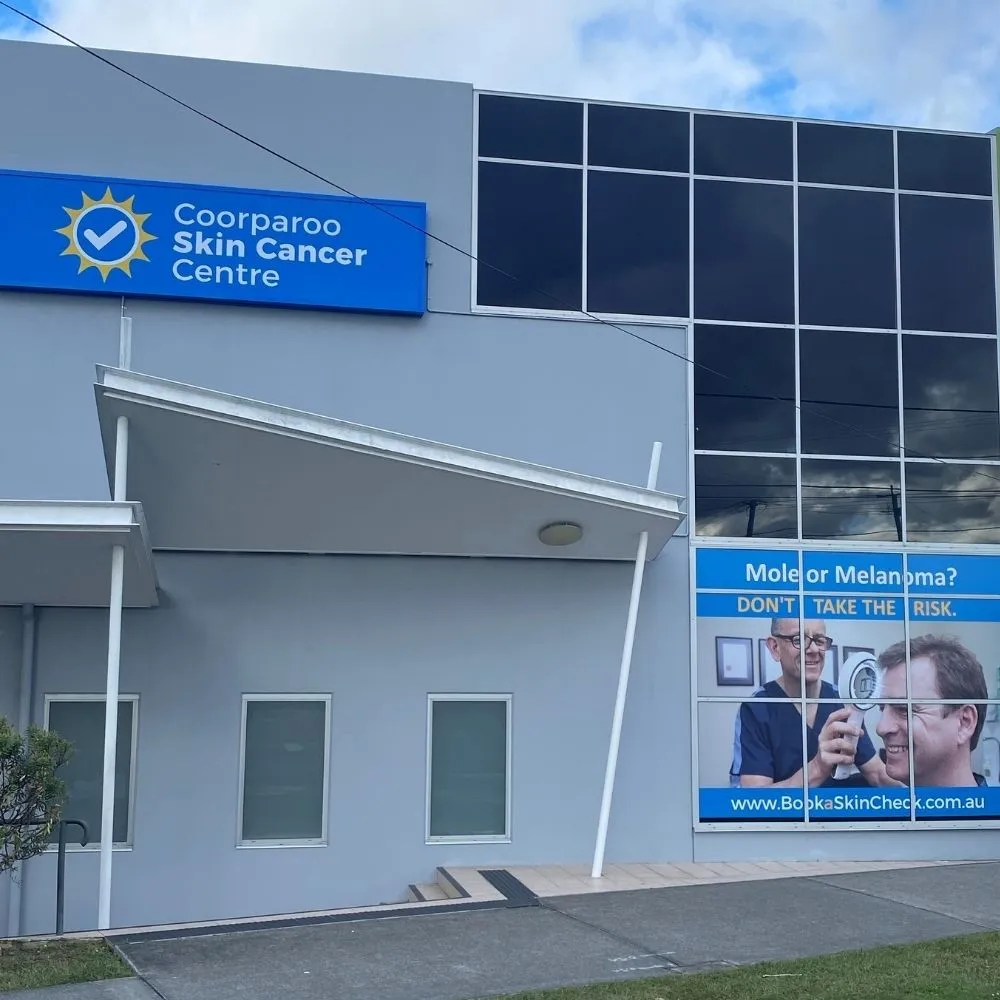Moles are small spots on your skin. Almost everyone has them, and most are harmless. But some...
_page1_image9-jpg-3.jpeg?height=200&name=ABCDEFG%20melanoma%20guide__Al%20Nour%20(2)_page1_image9-jpg-3.jpeg)
We are a private billing clinic. Medicare rebates available.
No referral required.
Opening hours:
Mon: 8.00am – 5.00pm
Tue to Fri: 7.00am - 5.00pm
Address:
177 Old Cleveland Rd
Coorparoo, QLD 4151
Phone: 07 3324 0466
Email: coorparoo.reception@skincancercentres.com.au
Parking:
Parking is available under the building in the first 2 rows. Parking is free for the first 2 hours after this time a $5.00 fee will apply. Parking is available in the upstairs car park for a duration of 30 mins only after this time a $5.00 fee will apply. Street parking is also available.

Medicare rebate available
After hours appointment (before 8.00am): $205.00
$49 baseline images
$100 sequential images
Cancellation policy
We require a minimum of 2 hours’ notice for any appointment cancellation to allow time to reallocate your appointment to another patient. If you cancel within 2 hours of your appointment, or fail to attend a booked appointment, we reserve the right to charge a pre-payment prior to future bookings. In the case of pre-paid services, the service will be forfeited.
At our skin cancer clinic in Brisbane, Coorparoo Skin Cancer Centre, we provide a comprehensive approach to looking after your skin health. The qualified team works primarily in skin cancer diagnosis and treatment, and experienced doctors are supported by a highly trained team of support staff for your optimal care. Following our vision of a world where nobody dies of skin cancer, we deliver the highest standard of care and save lives every day. Our medical team will provide you with expert advice, utmost skill – and most importantly, peace of mind. We can help you with skin cancer screening and diagnosis, total body photography, surgical and non-surgical skin cancer treatments, mole removal, and wound and scar management.
Conveniently located on Old Cleveland Road, just 15 minutes from the Brisbane CBD, free on-site parking is available under the building or there is paid parking on the street. If you arrive by car, entry via Ames Street is best. If you're taking public transport, the nearest bus stop is just down the road at Old Cleveland Rd at Dowar Street Stop 20, outside the Coorparoo vet clinic.
Your health and satisfaction are at the forefront of everything we do. We understand that all patients have varying requirements and aspirations; therefore we will always tailor your care plan for you and work hard to exceed your expectations. Thank you for choosing us for your skin check in Coorparoo!

Squamous cell carcinoma can appear as a scaly red patch on sun-exposed areas of the skin, an open sore that won't heal, a rough or thick patch of irritated skin, a raised growth, or even a blister. They can become crusty and easily bleed.
Conveniently located on Old Cleveland Road, Coorparoo Skin Cancer Centre is located just 15 minutes from the Brisbane CBD. Free on-site parking is available under the building or there is paid parking on the street. If you arrive by car, entry via Ames Street is best. If you're taking public transport, the nearest bus stop is just down the road at Old Cleveland Rd at Dowar Street Stop 20, outside the Coorparoo vet clinic.
Melanoma typically stands out as looking different from the rest of the lesions on your skin and often shows one of the ABCD signs: Asymmetry, irregular Border, multiple Colours, or Diameter larger than 6mm. They can also be Elevated (stand out from the skin), Firm to the touch, or Growing. Melanoma may show no symptoms at all, which is why regular professional skin checks are so important.
In its advanced stages, melanoma of the skin can spread to other organs of the body and become fatal. Some early signs of spreading include hard or swollen lymph nodes, pain, feeling tired or unwell, weight loss, yellow eyes and skin, stomach pain, and more. The good news is that melanoma is usually curable if detected early, before it can spread, which is why regular professional skin checks are so important.
Doctors with advanced training in skin cancer medicine perform comprehensive skin checks in dedicated facilities that are fully equipped to diagnose, biopsy and treat all skin cancers using the latest tools and technologies for earliest diagnosis. They have advanced qualifications and dedicate their practise full-time to skin cancer management.
WHY CHOOSE US
